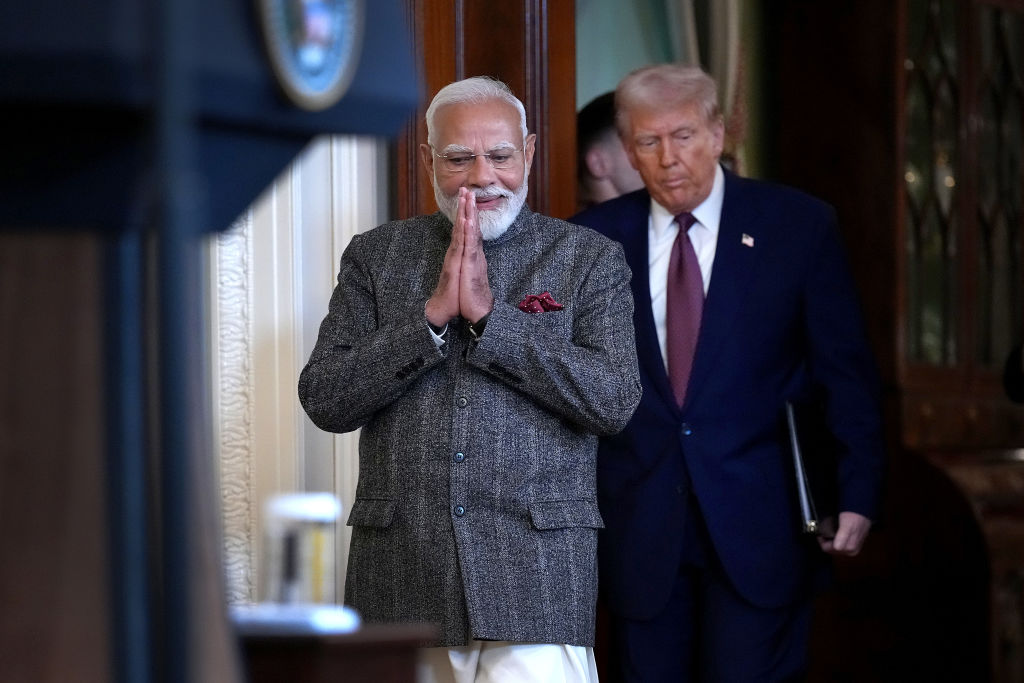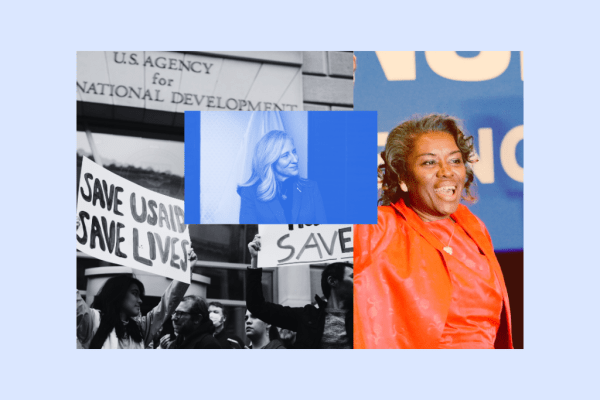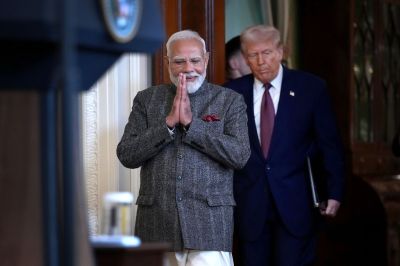Happy Friday! A humpback whale briefly swallowed a 24-year-old kayaker off the coast of Chile on Saturday before spitting him out unharmed. In a video of the incident, the man’s father can be heard telling him to stay calm, while trying to direct him back to his overturned boat post-spit-out. We’re not sure we’d have the same mental clarity after witnessing a miracle of biblical proportions.
Quick Hits: Today’s Top Stories
- Hamas on Thursday announced plans to free Israeli hostages as scheduled on Saturday, reversing its previous threat to delay the implementation of a three-stage, U.S.-brokered ceasefire deal. The reversal followed Israeli Prime Minister Benjamin Netanyahu’s warning that “intense fighting” would resume in the Gaza Strip barring the terrorist group’s continued release of hostages, though it appears to fall short of President Donald Trump’s demand that Hamas return “all” of the remaining abductees by Saturday. Negotiations to decide the terms of the second phase of the agreement are ongoing.
- An Afghan man reportedly drove a car into a crowd of protesters in Munich on Thursday, injuring at least 28 people. Counter-terrorism police took over the investigation into the incident after authorities found that the suspect, a 24-year-old asylum-seeker who arrived in Germany in 2016, had an “extremist background.” The ramming came on the eve of the annual Munich Security Conference, which is set to be attended by world leaders including Vice President J.D. Vance and Ukrainian President Volodymyr Zelensky.
- Apple and Google reinstated TikTok to their app stores on Thursday, reversing the platform’s removal last month following the Supreme Court’s decision to uphold a law requiring Chinese firm ByteDance to divest its ownership of the app or face an effective ban. The move reportedly followed assurances by U.S. Attorney General Pam Bondi that the government would not immediately enforce the legislation, which imposes hefty civil penalties on app store owners and servers who allow TikTok to operate. Trump had previously signed an executive order delaying the ban’s enforcement while he seeks to negotiate a deal that addresses lawmakers’ national security concerns about the app.
- Danielle Sassoon resigned from her position as acting U.S. attorney for the Southern District of New York on Thursday, in protest of the Trump administration’s order directing federal prosecutors to drop charges against New York City Mayor Adams on Monday. Prosecutors charged Adams in September 2024 with bribery, wire fraud, conspiracy, and soliciting campaign contributions from foreign nationals. In a letter to Attorney General Bondi, Sassoon—who was appointed by Trump to her now-former position last month—wrote that the decision to dismiss the case was “inconsistent with my ability and duty to prosecute federal crimes without fear or favor and to advance good-faith arguments before the courts.”
- The Senate voted 52-48 on Thursday to confirm Robert F. Kennedy Jr. as the head of the Department of Health and Human Services. Sen. Mitch McConnell—the lone Republican dissenter and a polio survivor—released a statement on Thursday expanding on his opposition to Kennedy, a vaccine skeptic. “In my lifetime, I've watched vaccines save millions of lives from devastating diseases across America and around the world,” he said. “I will not condone the re-litigation of proven cures, and neither will millions of Americans who credit their survival and quality of life to scientific miracles.”
- The Office of Personnel Management advised federal agencies on Thursday to fire most of their estimated 220,000 probationary employees—that is, workers who have generally held government jobs for around one to two years. Following the push, the Department of Veterans Affairs announced that it had dismissed more than 1,000 employees and the U.S. Forest Service indicated plans to fire more than 3,400 people. The layoffs marked the Trump administration’s latest effort to dramatically reduce the federal workforce.
- Democratic Sen. Tina Smith of Minnesota said on Thursday that she will not seek reelection in 2026, paving the way for a crowded Democratic primary in the blue-leaning battleground state. Minnesota Lt. Gov. Peggy Flanagan already announced plans to run for the Senate seat, and her boss, Minnesota Gov. Tim Walz—former Vice President Kamala Harris’ running mate in the 2024 presidential election—is reportedly considering a bid. Democratic Reps. Ilhan Omar and Angie Craig have also been named as possible contenders for the seat.
‘Make India Great Again’

During Narendra Modi’s visit to Washington on Thursday—his first of President Donald Trump’s second term—the Indian prime minister was in a creative mood. “Borrowing an expression from America, our vision for a developed India is Make India Great Again, or MIGA,” he proclaimed. “When America and India work together, that is, when it’s MAGA plus MIGA, it becomes MEGA!”
The pun may not have been comedy gold, but the prime ministerial wordplay summed up the main theme of Thursday’s summit: greater cooperation between the U.S. and India. As both countries seek to check rising Chinese aggression in the Indo-Pacific, Trump and Modi also sought to smooth over potential tensions that could stem from Trump's aggressive agenda on trade and immigration.
The personal bond between the two men aided in that goal; Trump and Modi have publicly extolled their warm personal relationship since the first Trump presidency. Both self-proclaimed nationalists, the leaders emphasized their closeness in a pair of joint rallies—dubbed “Howdy, Modi,” and “Namaste, Trump”—in 2019 and 2020. During Thursday’s press conference, Trump called Modi “a very special person, while the Indian prime minister referred to Trump as “my dear friend” and praised him for having “cherished and revitalized the U.S.-India relationship.”
But a common adversary, more than any personal chemistry, may be to thank for the countries’ close ties. “Both the American and Indian positions see China as a disruptive force in the Indo-Pacific,” Harsh V. Pant, the director of studies and foreign policy at the Observer Research Institute, a New Delhi-based think tank, told TMD.
India views Chinese attempts to exert more control abroad with alarm, particularly as the People’s Republic expands its influence in the South China Sea and Africa. But aligning firmly with the U.S. against China cuts against India’s usual way of doing business—the country has historically practiced a foreign policy of “multipolarity” by avoiding firm treaty commitments that bind it to any one country. Despite participating as a key member of the Quadrilateral Security Dialogue, or “Quad”—a periodic meeting of India, Japan, Australia, and the United States—New Delhi is one of the largest buyers of Russian oil and arms and is currently partnering with Iran on a port development project despite U.S. opposition.
But China demonstrates the limits of India’s guiding international philosophy. “India definitely believes in multipolarity and multi-alignment, with the exception of when it comes to China,” Richard M. Rossow, the chair on India and emerging Asia economics at the Center for Strategic and International Studies, told TMD. In 2020, a long-simmering dispute over the two countries’ Himalayan border erupted into hand-to-hand combat, resulting in the deaths of 20 Indian soldiers and four Chinese soldiers. The two sides only came to an agreement formally ending hostilities late last year.
In the face of the persistent threat posed by Beijing, India now appears to be preparing for a deeper security partnership with the United States. The largest arms purchaser in the world, it has begun to shift from buying mostly Russian-made systems to looking to American suppliers. Last year, India signed an agreement for the American company General Electric to build fighter jet engines in India, the first such deal the U.S. has made with a non-ally.
And even without a formal security pact, the two countries’ militaries are working together more than ever. Last year, India dramatically stepped up anti-piracy operations around the Horn of Africa, becoming a full member of the U.S.-led Combined Maritime Forces. Also last year, the U.S. Coast Guard conducted its first-ever operation off of the Indian territory of the Andaman and Nicobar Islands, which lie east of mainland India across the Bay of Bengal. India has traditionally been reluctant to grant the U.S. access to these islands.
During the summit on Thursday, Trump indicated plans to take that defense cooperation a step further. Beginning this year, he said, the U.S. will ratchet up military sales to New Delhi “by many billions of dollars.” The president also announced America’s intention to eventually provide India with F-35 fighter jets, which would make it the first non-NATO and non-Pacific ally to operate the aircraft.
But if defense cooperation is becoming easier, trade may be a stickier point. While only the 10th-largest importer of U.S. goods, India exports more to the United States than any other country, to the tune of roughly $87 billion. It imports just $42 billion, an imbalance that Trump would like to see corrected through so-called reciprocal tariffs. Modi attempted to sidestep the threatened levies by announcing plans to reduce tariffs on dozens of U.S.-made products, from chemicals and electronics to luxury motorcycles.
The effort seemed to come up short. Just before his meeting with Modi, the president issued an executive order directing agencies to draw up plans to draw up reciprocal tariffs, singling out India by name. Modi, meanwhile, said that India would work to correct the trade imbalance while more than doubling trade volume to a whopping $500 billion by 2030. “They’re going to be purchasing a lot of our oil and gas,” Trump said at the joint press conference. “They need it. And we have it.”
Modi also appeared to be more than ready to work with Trump on another policy front: immigration. Last week, 104 Indian nationals who had attempted to enter the U.S. illegally were transported by military plane to Punjab as part of Trump’s campaign of stepped-up immigration enforcement. The migrants were reportedly shackled for at least part of the 40-hour flight, sparking outrage among Indian opposition politicians. “Will Prime Minister Modi stand up to his friend Donald Trump instead of hugging him?” opposition leader Jairam Raneh asked reporters. But Modi remained publicly quiet on the issue in the leadup to Thursday’s conference.
Speaking to reporters on Thursday, Modi said that India was “fully prepared” to take back any Indian national found attempting to enter the U.S. illegally. “The illegal component” of immigration is of “greater interest to the Trump administration” than curbing legal immigration, Sadanand Dhume, a senior fellow at the American Enterprise Institute who researches Indian politics, told TMD. But there are fears Trump could seek to target forms of legal immigration, namely the H1-B visa program of temporary work permits for highly skilled workers. An estimated 72 percent of current H1-B workers are Indian, dominating high-income positions like IT services.
India promotes the H1-B program as a source of good jobs for its rising educated classes, but some members of the Trump administration seek to restrict issuing the visa, arguing that it introduces competition with American workers. The debate sparked a public clash in December between the populists of the Trump coalition and erstwhile DOGE head Vivek Ramaswamy, himself an Indian-American, who passionately defended H1-B visas on X. It’s unclear what Trump himself plans to do with the program. The White House moved to sharply restrict issuing H1-B’s at the end of his first term, but it has yet to issue specific guidance this time around. The topic did not surface publicly on Thursday, in a possible indication that Modi’s willingness to cooperate on trade and deportations paid off.
Overall, it appears that both leaders were pleased with the results of Thursday’s summit. The U.S. president got his promise of a trade deal, and India further cemented its role as a significant partner with America.
Going into the meeting, India most likely wanted reassurance that its relationship with the U.S. would continue “on the upward trajectory that it’s enjoyed for the last 25 years,” Dhune told TMD. It appears that it largely will.
Worth Your Time
- Writing for The Atlantic, David A. Graham argued that Congress has relinquished its duty to serve as a check on executive power—as demonstrated by the Senate’s confirmation of Robert F. Kennedy Jr. on Thursday. “One lone Republican voted against all three: Kentucky’s Mitch McConnell, the man responsible for keeping GOP senators lined up behind Trump during his first four years in office. The rest have various justifications for voting more or less in lockstep. They say they were reassured by what they heard in meetings—as though they’ve never seen a nominee fib, and as though that outweighed long histories. They say that presidents deserve to have the advisers they want,” he wrote. “Behind closed doors, they might lay out a different calculation: Voting no on Cabinet members is a good way to tick Trump off while gaining little more than symbolism; better for them to keep their powder dry for real policy issues where they disagree with him. These rationalizations might have made sense for a distasteful nominee here and there, but what Trump has put forward is likely the least qualified Cabinet in American history.”
Presented Without Comment
Mediaite: Trump Questions If Mitch McConnell Really Had Polio After Voting Against RFK Jr: ‘He’s A Very Bitter Guy’
Also Presented Without Comment
Reuters: Trump’s Foreign Aid Freeze Stops Anti-Fentanyl Work in Mexico
Also Also Presented Without Comment
Axios: Zelensky to Trump: Putin Pretends to Want Peace Because He’s “Afraid of You”
In the Zeitgeist
It turns out that there’s an Israeli equivalent to NPR Music’s “Tiny Desk Concerts,” called “Aquarium.” But you don’t need to understand Hebrew to appreciate the mesmerizing voice of Doron Talmon, the front woman of the Tel Aviv-based band Jane Bordeaux.
Toeing the Company Line
- In the newsletters: Scott Lincicome checked in on the Inflation Reduction Act, Nick Catoggio wondered why Donald Trump’s second term feels different, and Will Rinehart considered our current moment of technological opportunity.
- On the podcasts: Jonah Goldberg and David French join Sarah Isgur on The Dispatch Postcast for a freewheeling conversation on cancel culture, American public schools, and more. And on today’s Advisory Opinions, Sarah and David contemplate the legality of Trump’s federal government overhaul.
- On the site: Kevin Williamson reminds readers that tariffs are taxes, Michael Brown unpacks Vice President J.D. Vance’s message at the Paris AI summit, and Mike Warren reports on how DOGE could affect the Virginia gubernatorial race.
Let Us Know
As the U.S. seeks to curb Chinese aggression, what role should non-ally countries like India play?









Please note that we at The Dispatch hold ourselves, our work, and our commenters to a higher standard than other places on the internet. We welcome comments that foster genuine debate or discussion—including comments critical of us or our work—but responses that include ad hominem attacks on fellow Dispatch members or are intended to stoke fear and anger may be moderated.
With your membership, you only have the ability to comment on The Morning Dispatch articles. Consider upgrading to join the conversation everywhere.